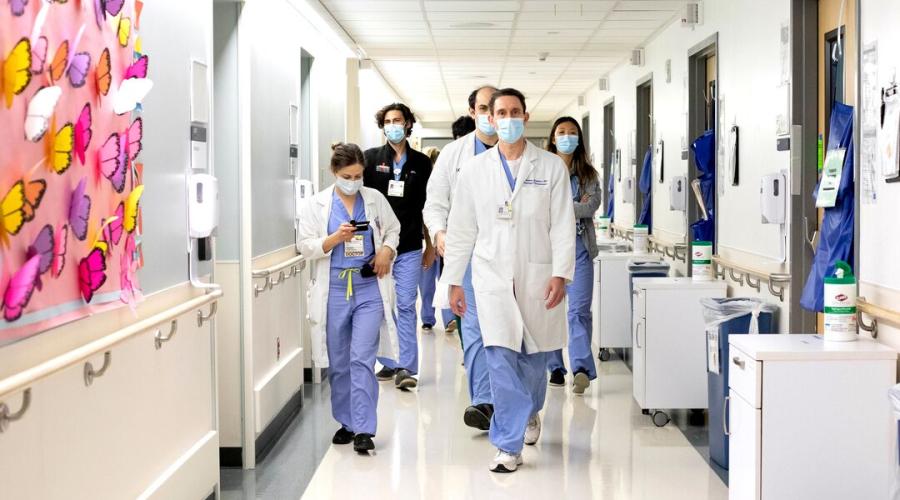
Increasing Collaboration to Best Serve Critically Ill Children
UCSF excels in handling complex medical issues and pioneering new, effective treatments for rare and life-threatening diseases. The Pediatric Intensive Care Unit (PICU) at UCSF hospitals is no different.
Many of the children admitted to a UCSF PICU have complex issues from life-threatening conditions. They typically have long histories with their specialty doctors that oversee their treatment regiments and monitor for serious complications like organ failure.
The most complex of these patients are those with a compromised immune system, whether from a disease or a necessary treatment like chemotherapy. If an immunocompromised child becomes critically ill and transfers to the PICU, determining the optimal treatment plan can be complicated.
“I wondered how we in the PICU could best coordinate our care with specialists to stay ahead of the curve. I wanted to add to the care process for children with complex issues by leveraging the expertise of my colleagues,” says Matt Zinter, MD, assistant professor of Pediatrics at UCSF in the Division of Critical Care.
After years researching pediatric critical care trends, in 2020 Zinter established the Pediatric Immunocompromised Critical Care Program at UCSF, which he actively directs. The program seeks to increase collaboration between caretakers in the PICU and specialty experts to create a true multidisciplinary approach for this most vulnerable group: high-risk children with disrupted immune systems.
A Collaborative Approach to Critical Care
Zinter’s program hosts frequent meetings to bring together a core team of experts and on-site care providers from a variety of professions and disciplines. Typically, there are around 40 attendees, with PICU workers like critical care pediatricians, nurses and social workers joining experts in cancer, immunology, and blood diseases.
The group’s primary focus is providing optimal care for the high-risk immunocompromised patients currently in the PICU. Potential treatment routes are considered and weighed, helping care providers in the PICU determine the best way to care for individuals based on their unique medical situation and history.
“The goal is to create a collective thinktank. We’re not replacing any clinical processes, but instead providing opportunities for the active care providers in the PICU to get the perspective of other experts and crowdsource potential treatment options,” says Zinter.
Prevention, early detection and targeted treatments are all priorities for Zinter’s program. Personalized medicine is emphasized by bringing novel diagnostic tools and new treatments through clinical trials to patients most in-need.
The group also discuss patients that aren’t in the PICU but have a high-risk to become critically ill, such as a child undergoing a second stem cell transplant. This mutual exchange of information between teams as they discuss specific patients promotes harmony between teams and eases the process of transferring patients to where they can be best cared for.
Reinforcing Positive PICU Culture
One win that has stuck with Zinter was a 4-year-old who had relapsed leukemia and required more chemotherapy. A terrible infection then developed in their chest that required a breathing machine and intensive chest tubes for weeks. Doctors in the PICU collaborated with the child’s team of cancer specialists and changed the chemotherapy agent so the child could properly heal from the infection while still fighting the cancer. After more than two months in the PICU, the child’s cancer is in remission along with a full recovery from the infection.
To celebrate these success stories, social workers follow-up with families and get permission to share pictures and updates at the program’s meetings. Taking time to remember successes is crucial for refuting assumptions of futility or feelings of grief that can develop among PICU workers.
“If you’re not feeling confident that you can make a difference, your work will suffer,” says Zinter. “I want those working in the PICU to be equipped with the resources, information and mindset to make a positive difference when it matters most.”
The Pediatric Immunocompromised Critical Care Program is made possible thanks to the following individuals:
Michelle Hermiston, MD, PhD, Immunotherapy and CAR-T program
Chris Dvorak, MD, Division Chief of Allergy, Immunology, and Bone Marrow Transplantation
Sandhya Kharbanda, MD, Medical Director, Pediatric Stem Cell Transplant
Jenny Check, RN, Program Coordinator
